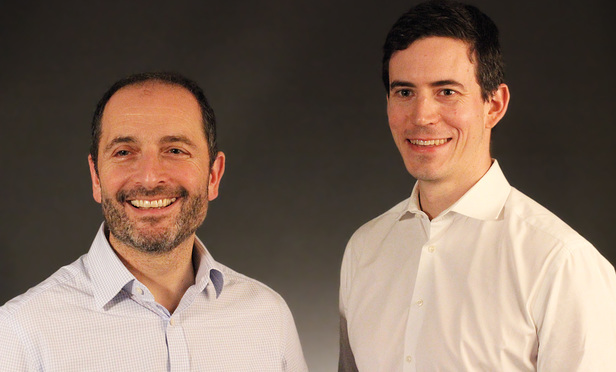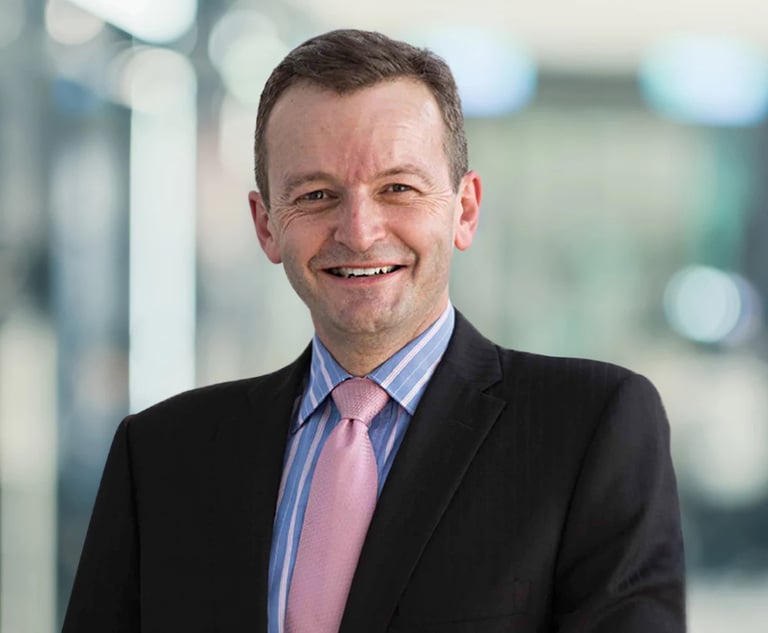Slaughter and May chooses six more startups to receive free legal support
Firm picks blockchain business and greentech startups for third round of innovation initiative
January 15, 2019 at 05:11 AM
4 minute read
 Slaughter and May fintech co-heads Rob Sumroy and Ben Kingsley
Slaughter and May fintech co-heads Rob Sumroy and Ben Kingsley
Slaughter and May has selected six startups for the third round of its 'Fast Forward' tech initiative, which supports promising new businesses by providing free legal advice and access to to other magic circle-standard services.
As with previous rounds, the firm will provide £30,000 worth of free legal and business services to the successful applicants.
Unlike in previous rounds, the latest intake was open to non-fintech startups, meaning that new partners will be able to be involved in the programme – a move Kingsley described as "a nice knock-on effect". The new focus has meant a change in name for the programme, which was previously known as Fintech Fast Forward.
Lawyers who will work with the startups include private equity head Jeff Twentyman, tax disputes co-head Dominic Robertson, real estate partner John Nevin, corporate partners Filippo de Falco and Christian Boney, and intellectual property partner Duncan Blaikie.
Slaughters fintech co-head Ben Kingsley told Legal Week: "We were looking for companies trying to do something a bit ambitious that they may need some fairly bespoke legal support to achieve; those who are pushing the envelope and are likely to run into some legal complexity that needs to be overcome."
Kingsley said the firm looked for a "diversity of companies" for the programme, with a long list of 30 narrowed down to the final six after applications opened in October last year.
The firm has continued to work with a number of companies from previous intakes, including TrueLayer, By Miles and WorldRemit. Kingsley added: "Part of the aim of the programme is to build a relationship with these companies and hopefully find a way to continue working together."
The six successful applicants were chosen by a consultative panel that includes Kingsley, Sumroy, Invoke Capital founder and CEO Mike Lynch, Santander UK chief customer and innovation officer Sigga Sigurdardotti,r and LocalGlobe partner Suzanne Ashman.
The chosen six:
- Bio-Bean, a greentech company that recycles used coffee grounds on an industrial scale for the manufacture of biofuels and biochemicals. "Bio-bean immediately caught my eye because they're obviously a very green business, and are nothing like the other companies we've had in the programme before. It's a really interesting business model for us and completely different to anything we've focused on before," said Kingsley.
- Bundle, an email collaboration tool with a "very compelling and very ambitious founder", according to Kingsley. "I really like Bundle because I, like many other professionals, experience the pain of an email inbox and they're trying to make that easier for us."
- Coconut, a current account product designed for freelancers and small-business owners. Kingsley said: "We had a great interview meeting with them. The team here felt instinctively that they'd enjoy working with them. It also feels like a great outcome to help a business whose reason for being is to make life easier for small businesses – because they need all the help they can get."
- CreditMint, which is building a blockchain to trade digital assets. Kingsley said blockchain is "fast becoming ubiquitous, and so it's great to have at least one of our new cohort doing something in the blockchain space".
- Magway, which is aiming to create a new e-commerce delivery system to transport packages via underground pipes with magnetic propulsion. Kingsley comments: "All you have to do is go to their website and look at the intro video, and you'll understand how exciting and compelling a proposition it is."
- Tully, which helps people manage their debts with planning, money coaching and support. Kingsley said: "Not only are they an interesting business, but they have an overtly social, good purpose."
This content has been archived. It is available through our partners, LexisNexis® and Bloomberg Law.
To view this content, please continue to their sites.
Not a Lexis Subscriber?
Subscribe Now
Not a Bloomberg Law Subscriber?
Subscribe Now
NOT FOR REPRINT
© 2025 ALM Global, LLC, All Rights Reserved. Request academic re-use from www.copyright.com. All other uses, submit a request to [email protected]. For more information visit Asset & Logo Licensing.
You Might Like
View All
Hogan Lovells and Burges Salmon Secure Lead Roles in Largest Ever UK Defence Ministry Contract
2 minute read
Latham, Cleary, Clifford Chance Help Middle East Sovereign Wealth Funds Monetise Assets
3 minute read
‘The US Market Is Critical’: KPMG’s Former Head of Global Legal Services On the Big Four Firm’s Legal Arm Entering the US
6 minute readTrending Stories
- 1Orrick Loses 10-Lawyer Team to Herbert Smith in Germany
- 2‘The US Market Is Critical’: KPMG’s Former Head of Global Legal Services On the Legal Arm of the Big Four Firm Entering the US
- 3Justice Marguerite Grays Elevated to Co-Chair Panel That Advises on Commercial Division
- 4McDermott Continues UK Growth With Another Partner Hire in London
- 52 Texas Lawyers Vie for Prominent Post: 2025-2026 Election
Who Got The Work
J. Brugh Lower of Gibbons has entered an appearance for industrial equipment supplier Devco Corporation in a pending trademark infringement lawsuit. The suit, accusing the defendant of selling knock-off Graco products, was filed Dec. 18 in New Jersey District Court by Rivkin Radler on behalf of Graco Inc. and Graco Minnesota. The case, assigned to U.S. District Judge Zahid N. Quraishi, is 3:24-cv-11294, Graco Inc. et al v. Devco Corporation.
Who Got The Work
Rebecca Maller-Stein and Kent A. Yalowitz of Arnold & Porter Kaye Scholer have entered their appearances for Hanaco Venture Capital and its executives, Lior Prosor and David Frankel, in a pending securities lawsuit. The action, filed on Dec. 24 in New York Southern District Court by Zell, Aron & Co. on behalf of Goldeneye Advisors, accuses the defendants of negligently and fraudulently managing the plaintiff's $1 million investment. The case, assigned to U.S. District Judge Vernon S. Broderick, is 1:24-cv-09918, Goldeneye Advisors, LLC v. Hanaco Venture Capital, Ltd. et al.
Who Got The Work
Attorneys from A&O Shearman has stepped in as defense counsel for Toronto-Dominion Bank and other defendants in a pending securities class action. The suit, filed Dec. 11 in New York Southern District Court by Bleichmar Fonti & Auld, accuses the defendants of concealing the bank's 'pervasive' deficiencies in regards to its compliance with the Bank Secrecy Act and the quality of its anti-money laundering controls. The case, assigned to U.S. District Judge Arun Subramanian, is 1:24-cv-09445, Gonzalez v. The Toronto-Dominion Bank et al.
Who Got The Work
Crown Castle International, a Pennsylvania company providing shared communications infrastructure, has turned to Luke D. Wolf of Gordon Rees Scully Mansukhani to fend off a pending breach-of-contract lawsuit. The court action, filed Nov. 25 in Michigan Eastern District Court by Hooper Hathaway PC on behalf of The Town Residences LLC, accuses Crown Castle of failing to transfer approximately $30,000 in utility payments from T-Mobile in breach of a roof-top lease and assignment agreement. The case, assigned to U.S. District Judge Susan K. Declercq, is 2:24-cv-13131, The Town Residences LLC v. T-Mobile US, Inc. et al.
Who Got The Work
Wilfred P. Coronato and Daniel M. Schwartz of McCarter & English have stepped in as defense counsel to Electrolux Home Products Inc. in a pending product liability lawsuit. The court action, filed Nov. 26 in New York Eastern District Court by Poulos Lopiccolo PC and Nagel Rice LLP on behalf of David Stern, alleges that the defendant's refrigerators’ drawers and shelving repeatedly break and fall apart within months after purchase. The case, assigned to U.S. District Judge Joan M. Azrack, is 2:24-cv-08204, Stern v. Electrolux Home Products, Inc.
Featured Firms
Law Offices of Gary Martin Hays & Associates, P.C.
(470) 294-1674
Law Offices of Mark E. Salomone
(857) 444-6468
Smith & Hassler
(713) 739-1250









